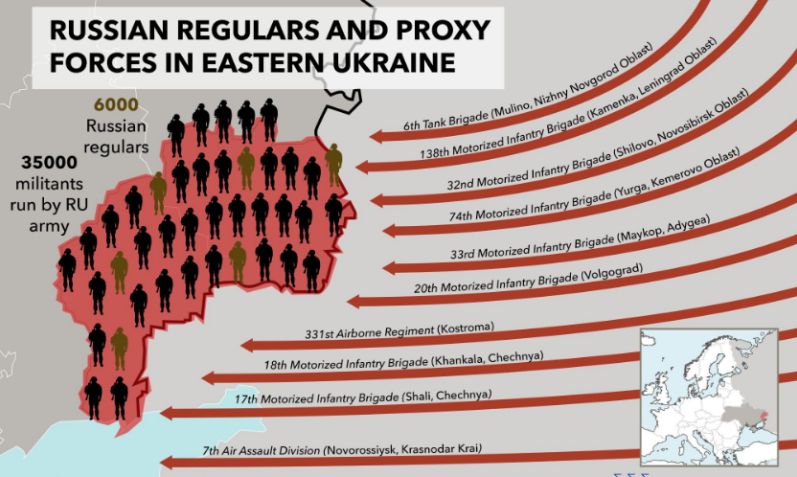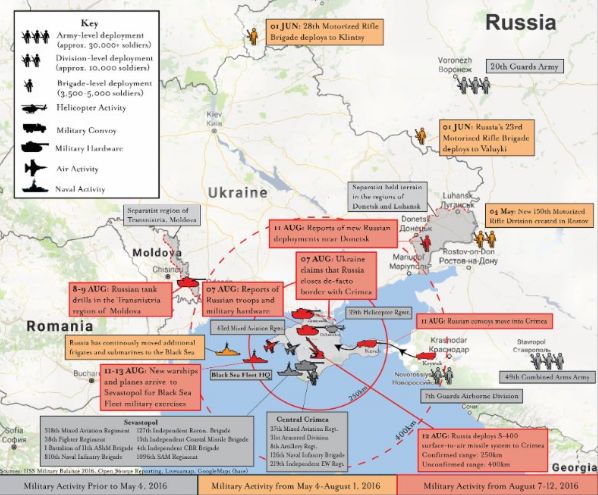By Eric Vandenbroeck and co-workers
Vladimir Putin summoned his security council, and the Russian Navy announced
war games in the Black Sea a day after the Russian president accused Ukraine of
trying to provoke a conflict over Crimea, which Moscow seized and annexed in
2014.
Ukraine has called the accusations false and says they look like a
pretext for Russia to escalate hostilities. Such an escalation could be used by
Putin to demand better terms in the
Ukraine peace process, or to inflame nationalist passions at home ahead of
Russian parliamentary elections next month.
Incursions of the type that the Russia's Federal Security Service (FSB)
reported Wednesday had frequently occurred on both sides of the conflict in
eastern Ukraine and claims of similar activity in Crimea have been made before.
But the evidence as to what occurred this time is to say the least, shaky. In
staging such an operation, however, Ukraine would risk igniting a military
conflict with Moscow, something it wants to avoid. At the same time, though, Kiev
did little to stop non-state actors from destroying infrastructure carrying
electricity into Crimea in late 2015.
There are concerns in Ukraine that Russia could use the alleged plot in
Crimea to justify more military incursions into the country. Fighting in
eastern Ukraine has already ramped up in recent months. And since the European
Union voted to extend sanctions against Russia until January 2017, Moscow has
no immediate incentive to clamp down on the violence. Russia could in fact
benefit if the fighting were to escalate, thereby weakening Ukraine and getting
the West's attention.
But a major military push into Ukraine would be risky for Russia. For
one thing, it would likely galvanize Western support for Ukraine. For another,
it would strengthen the European Union's resolve to maintain sanctions against
Russia despite the uncertainty within the bloc following
the Brexit vote. At the same time, Moscow could benefit from
intensified but limited activity, for instance, buildups to support operations
against Ukrainian militants in Crimea, particularly as September parliamentary
elections approach. Support for the ruling party, United Russia, has waned, and
the Kremlin could use the news of security flare-ups in Ukraine to stir
nationalism. This is likely why reports that the FSB had thwarted a terrorist
attack in Crimea, and Russian President Vladimir Putin's quick statement
condemning the plot, were flashed across all major Russian media today.
These events also come at a pivotal point in the negotiation process
between Russia and the West. U.S. President Barack Obama has hinted that he
would like to strike a deal with Russia over the Ukrainian conflict before the
end of his term, which leaves only a few months. Also, Putin would like one
last sit-down with the American leader, who has not granted him the same
legitimacy on the global stage that previous U.S. presidents have. In the past
few months, the pace of diplomatic efforts over the Ukraine conflict, as well
as negotiations over Syria and Nagorno-Karabakh, has increased, yet differences
remain over the nature and timing of the political and security concessions
that each side must make to find a lasting resolution. Now, the latest events
in Crimea could serve as grounds for an escalation, a turn of events that would
have significant consequences not only for Russia's relationship with Ukraine
but also for its negotiations with the West.
Other comments today are, that a build-up of Russian military on
Ukraine's border with the Crimean region, which has been annexed by Moscow,
could reflect "very bad intentions," Ukraine's U.N. envoy warned on
Thursday after the U.N. Security Council discussed the growing tensions.Ukrainian U.N. Ambassador Volodymyr Yelchenko, who requested the closed-door meeting of the
15-member council, said Russia had amassed more than 40,000 troops in Crimea,
seized by Moscow in 2014, and on the Ukrainian border."These
numbers may reflect some very bad intentions and this is the last thing we
would like to happen," he told reporters."My
biggest hope is that this discussion (in the council) will help the Russian
Federation to understand that they cannot really continue with this kind of
behavior," Yelchenko said.
Russian President Vladimir Putin has pledged to take counter-measures
against Ukraine which he accused of sending saboteurs into Crimea to carry out
terrorist acts.
Yelchenko called on Russia to produce
proof of those accusations.
Russian U.N. Ambassador Vitaly Churkin dismissed concerns about a Russian
military build-up. He described the Security Council meeting as
"useful" to explain the situation."Instead
of counting our military they should be bringing an end to the conflict in
Donetsk and stop shelling civilians in Donetsk and Luhansk," Churkin told
reporters after the meeting.
Kiev in turn blames Moscow for the impasse, pointing to ongoing clashes
with pro-Russian rebels in the east; Moscow argues that Kiev is stalling on the
big political reforms it needs to implement."Russia
wants the regions (controlled by pro-Russian militants) re-integrated as a
blocking share in the Ukrainian political system," Andrei Kortunov says. "The aim is to guarantee that Ukraine
does not join Nato or move too far from Russia."
Of course that is what the Ukraine crisis has been about from the very
beginning. This is just the latest tense and unpredictable chapter.
However, it might be best for Kiev to let simply go of its eastern
Donbass region. And choose between its strategic interests and a psychological
and ideological attachment to a region it has already lost.
Underneath an infographic showing how the
Russian army directly participates in Russia's hybrid war in Eastern Ukraine.

Update 13
August: Russian build-up in and around Ukraine.

For updates
click homepage here